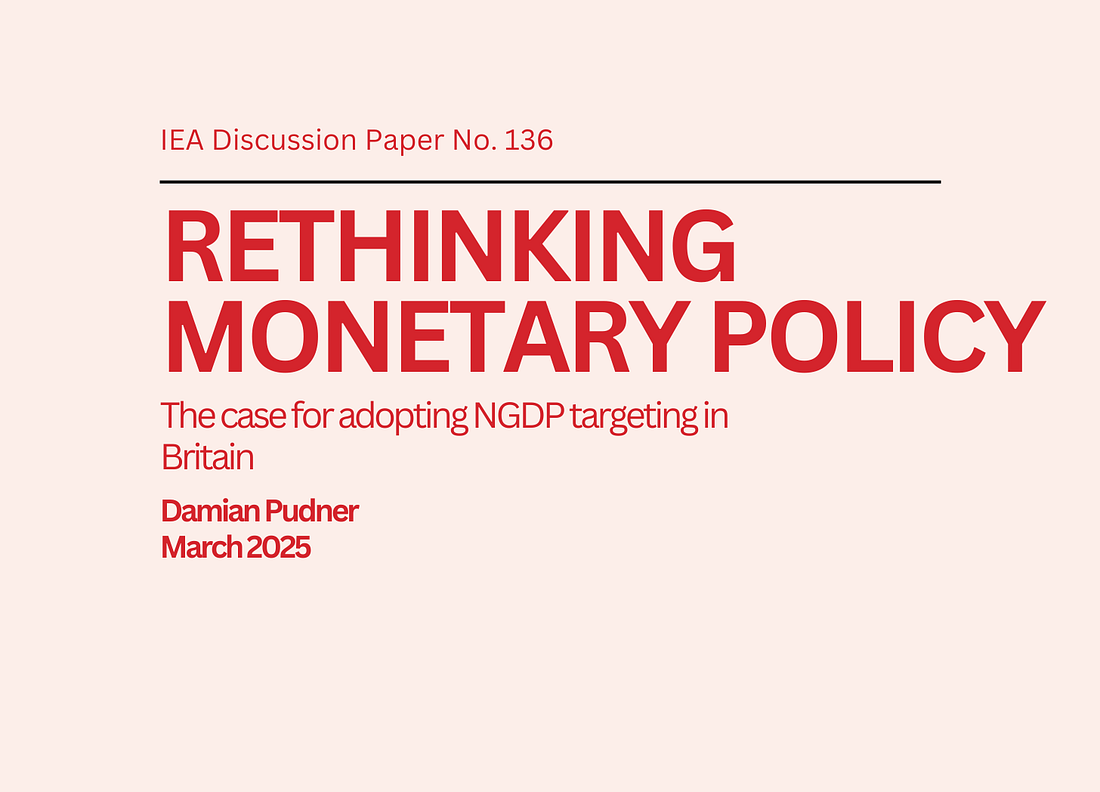|
By Damian Pudner
Inflation targeting fails to distinguish between demand and supply-side driven inflation, leading to suboptimal policy responses and delayed recovery from financial crises, such as the Covid-19 pandemic and 2008 financial crash.
Targeting the growth path of nominal GDP would provide a more stable macroeconomic environment, reduce policy uncertainty, and help to restore confidence in the Bank of England following post-Covid inflation.
The Government should consider updating the Bank of England’s mandate, replacing today’s inflation target with a new framework based on nominal GDP – or, in layman’s terms, total spending in the economy.
The Institute of Economic Affairs has published a new paper, arguing that nominal GDP targeting is superior to inflation targeting. Ahead of the Spring Statement, it suggests that the Government should reform the Bank of England’s mandate accordingly.
This research, authored by economist Damian Pudner, highlights how NGDP targeting could provide a more stable and predictable macroeconomic environment by focusing on total nominal spending, rather than inflation alone.
Pudner argues that this revised approach to monetary policymaking would reduce volatility in output and employment, and so help to support sustainable long-run economic growth.
The paper also suggests that nominal GDP targeting reduces policy uncertainty by minimising discretionary decision-making, improving transparency, and better anchoring expectations for businesses and financial markets.
This paper recommends that the following reforms are implemented:
Adopt a Nominal GDP Targeting Framework: The Bank of England should target a stable growth rate for nominal GDP, enabling monetary policy to respond appropriately to both demand and supply-side shocks.
Strengthen Communication: The Bank of England should clearly explain the rationale for NGDP Targeting to financial markets and the wider public to bolster confidence and ensure transparency in the new framework.
Establish NGDP Futures Market: Establishing a nominal GDP futures market would provide real-time market-driven guidance to policymakers while ensuring a more growth-friendly policy framework.
Throughout history, monetary regimes have evolved, and it is right to adapt the framework when it is clearly not fit for purpose. The Bank of England has been guided by an inflation target since the early 1990s, but that does not mean it must stick to this framework forever.
The Government should now consider implementing NGDP Targeting to create a more resilient macroeconomic environment.
This has been supported by former Chancellor Sajid Javid in the past, who included the following recommendation in his 2020 report on restoring post-covid growth: “the Government and the Bank should consider a shift in its remit from targeting inflation to nominal GDP, in order to better deliver sustained growth.”
David Beckworth, senior research fellow at the Mercatus Center at George Mason University, and former international economist at the US Department of the Treasury, said:
"This paper by Damian Pudner makes a compelling case for shifting Britain's monetary framework to nominal GDP targeting. Pudner lucidly demonstrates how NGDP targeting would provide greater economic stability, effectively managing both supply and demand shocks while preserving central bank credibility. It's essential reading for policymakers reconsidering the future of monetary policy."
Scott Sumner, former Director of the Program on Monetary Policy at the Mercatus Center at George Mason University, said:
“Nominal GDP targeting is not a panacea, but it does provide for a stable macroeconomic environment that allows other policy reforms to be successful. This IEA paper does an excellent job of explaining the advantages from creating a stable path for nominal income in a world where both the labor market and the financial system rely on nominal contracts.”
Douglas McWilliams, economist and Founder of Centre for Economics and Business Research (CEBR), said:
"A number of economists (including me) have made the case for nominal GDP targeting over the years. Damian Pudner updates this research and makes a really persuasive case which the Treasury should take on board".
You’re currently a free subscriber to Insider. For the full experience, upgrade your subscription.
Paid subscribers support the IEA's charitable mission and receive special invites to exclusive events, including the thought-provoking IEA Book Club.
We are offering all new subscribers a special offer. For a limited time only, you will receive 15% off and a complimentary copy of Dr Stephen Davies’ latest book, Apocalypse Next: The Economics of Global Catastrophic Risks.

